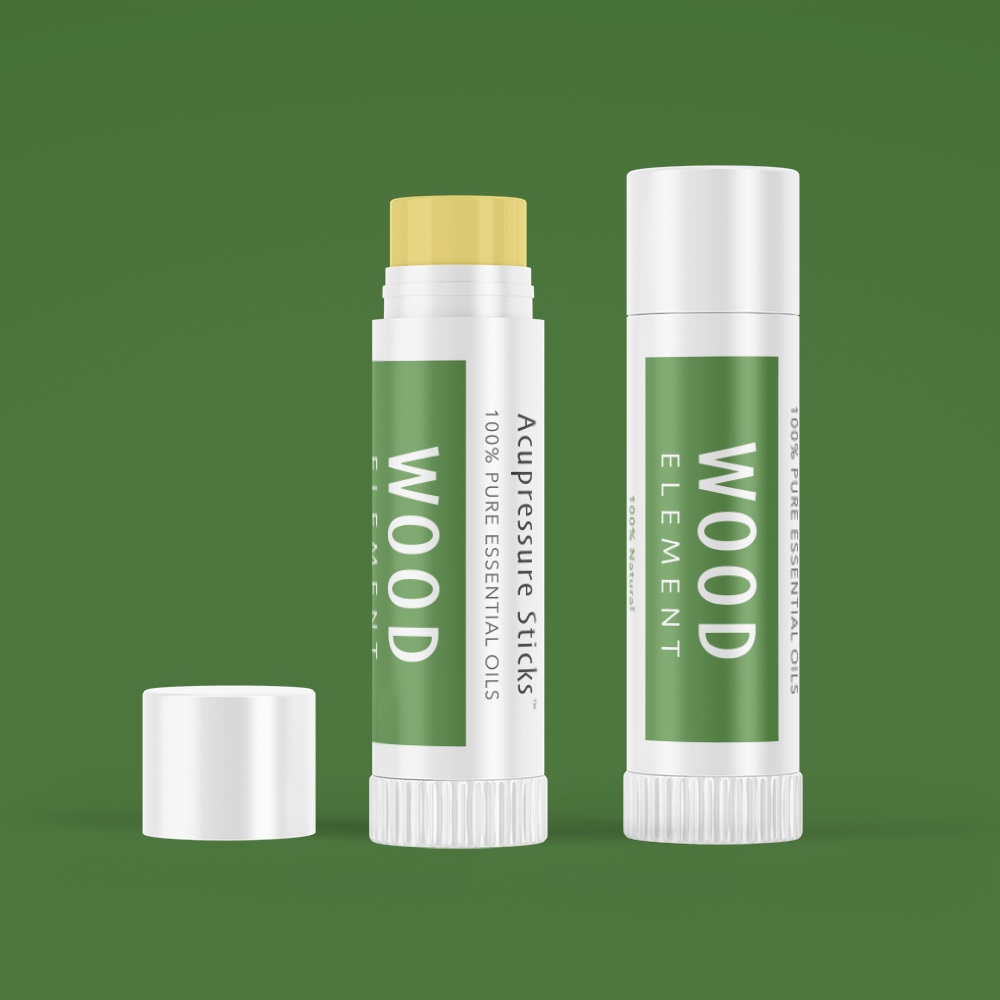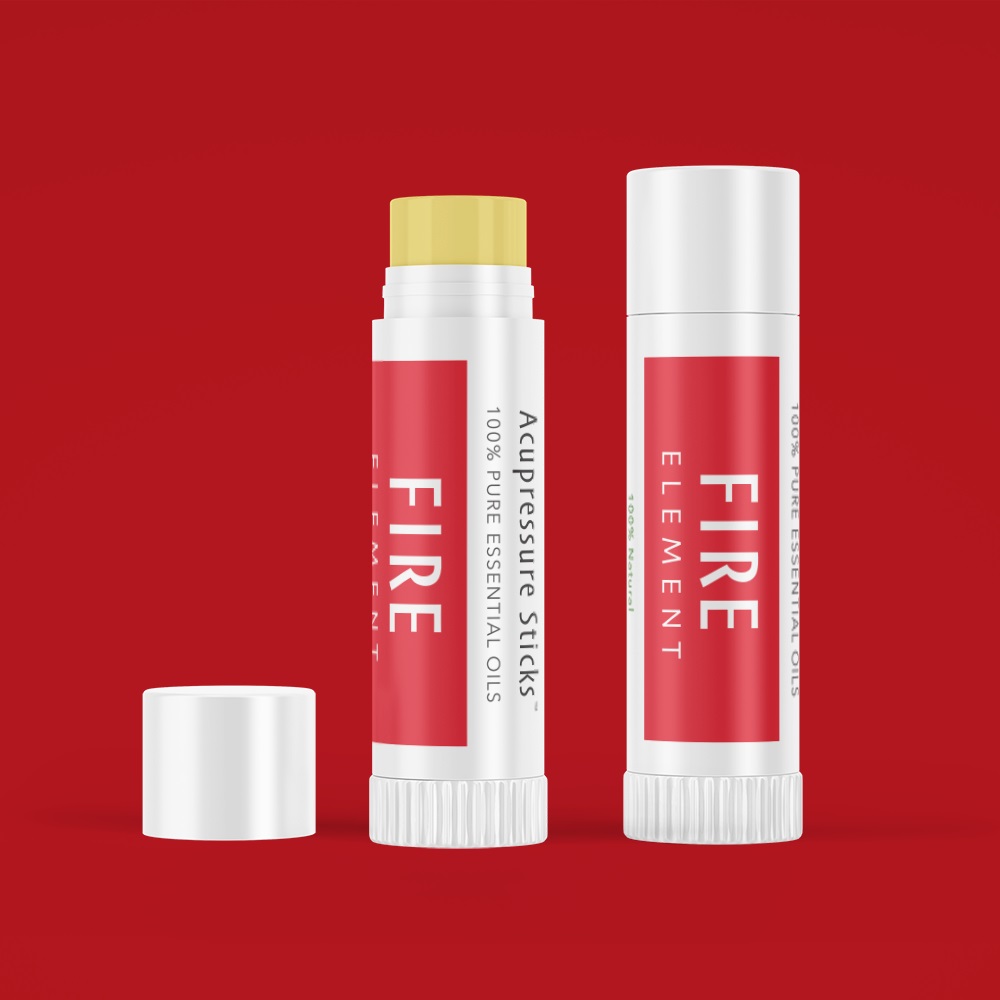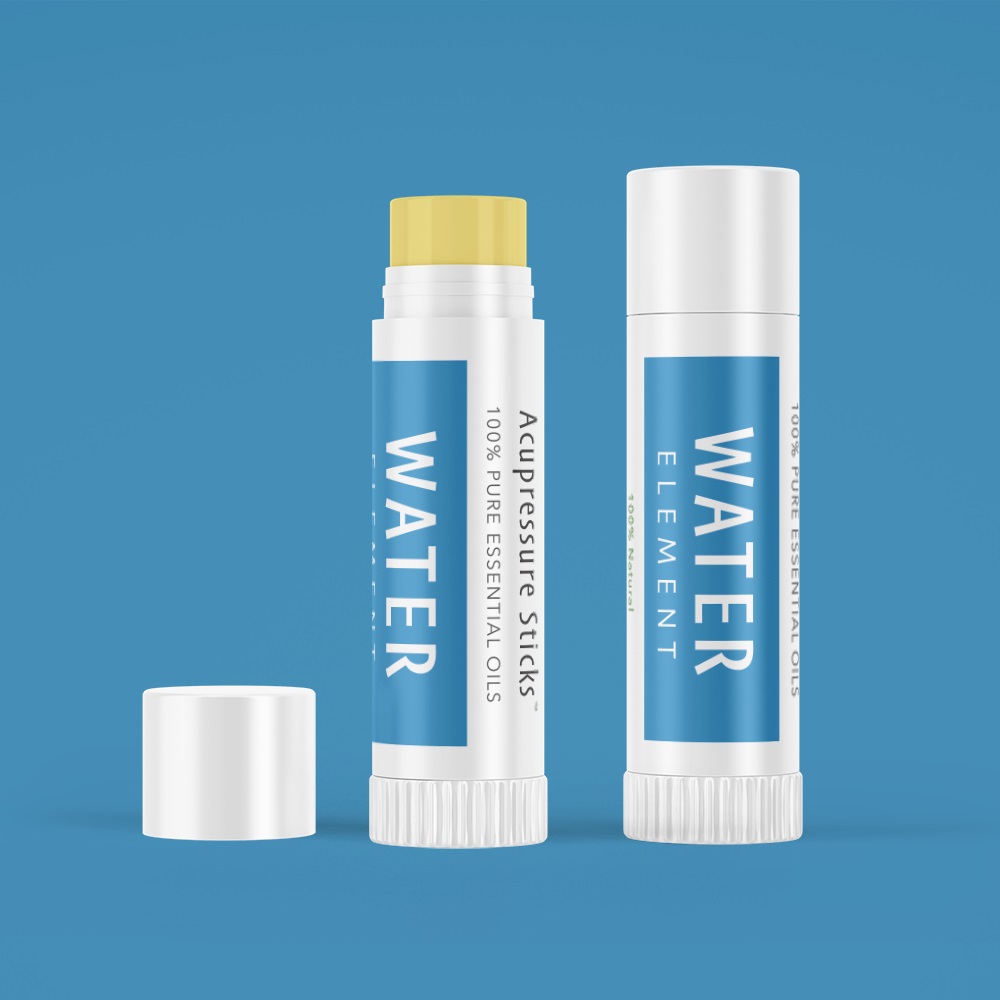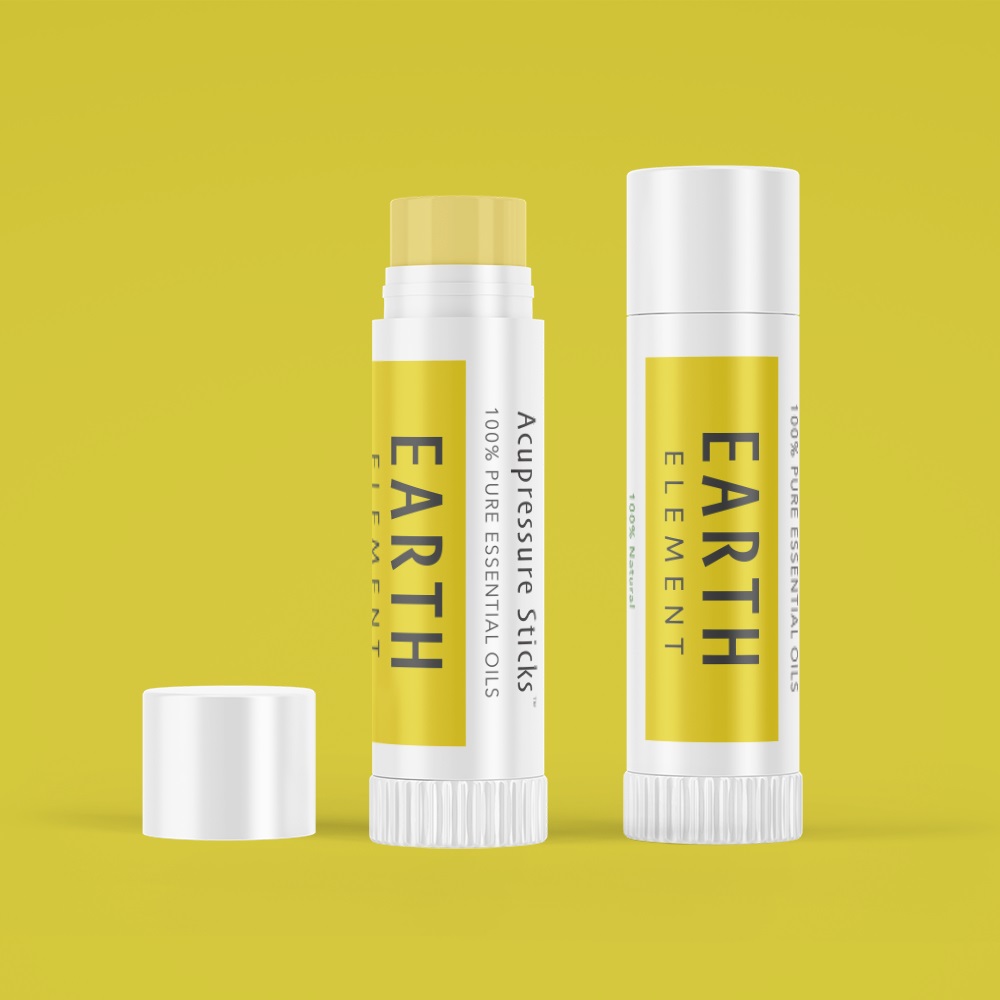Stress Relief
Managing Stress with Chinese Medicine
All of us have stressors in our lives; it is how we react to that stress that determines if stress is going to negatively impact our health in the long run. One person may be able to go with the flow during major life changes such as buying a new house or losing a job, whereas, another person faced with the same life challenges may have a major melt down. Here you will learn effective self-care methods to moderate your stress response so that you can navigate life with fewer emotional swings. For best outcomes using self-care, combine associated Aroma Acu-Sticks® to acu-points, topical remedies, and good lifestyle practices.
![]()
Aroma Acu-Therapy™ for Stress
Apply the Wood Element Aroma Acu-Stick® to activate Acupressure Point LV 3
Why? Acu-point Liver 3 soothes Liver Qi Stagnation that causes frustration leading to stress and helps to move through emotional blocks causing stress.
Heart 7
Apply the Fire Element Aroma Acu-Stick® to activate Acupressure Point HT 7
Why? Acu-point Heart 7 is the source point for the Heart energetic organ system and calms the Shen-Mind and soothes all negative emotions.
Apply the Water Element Aroma Acu-Stick® to activate Acupressure Point Bladder 62
Why? Acu-point Bladder 62 helps to calm the Shen and helps to clear the mind as the Bladder Channel travels up to the head.
Apply the Earth Element Aroma Acu-Stick® to activate Acupressure Point ST 36
Why? Acu-point Stomach 36 calms the mind and corrects Earth Element imbalances that can cause worry leading to stress.
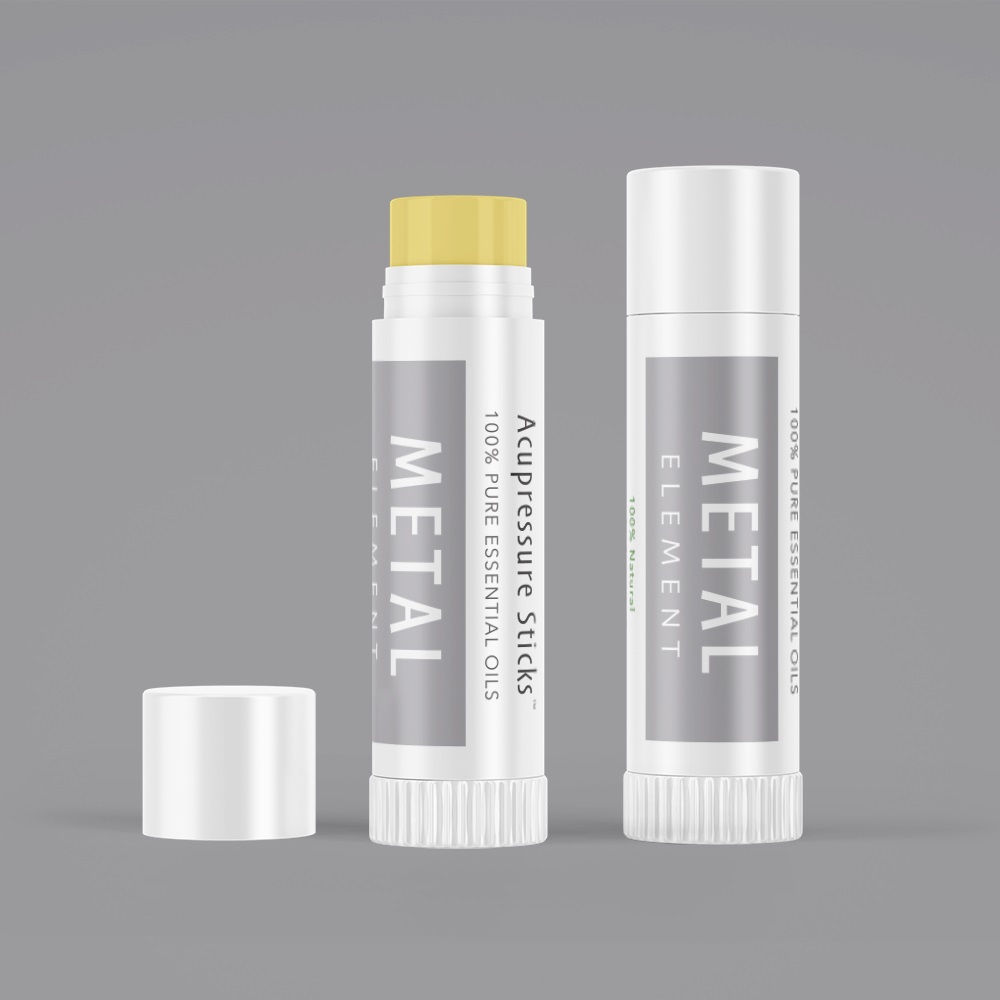 Large Intestine 4
Large Intestine 4
Apply the Metal Element Aroma Acu-Stick® to activate Acupressure Point Large Intestine 4
Why? Acu-point LI 4 used along with Acupoint Liver 3 are called the Four Gates and LI 4 serves to amplify the affect of LV 3 in unbinding stuck emotions.
Related Articles:
- How Aroma Acupressure Works
- Aroma Acu-therapy® Online Course
- Specific Acu-Point Locations
- The Five Elements of Chinese Medicine
Stress Patterns of Imbalance According to Chinese Medicine
Stress can be caused by a number of different imbalances according to Chinese medicine. By using Chinese medicinal remedies an Aroma Acu-Therapy™, one can bring balance to the Energetic Organ System(s) and associated Elements for long-term relief.
![]()
Stress-Liver and Wood Element Imbalance
In Chinese medicine, the Liver's job is to negotiate the free flow of energy in the body. Impaired Liver function can lead to energetic blockages, limiting availability of resources and sluggishness. In Chinese medicine this condition is often referred to as Liver Qi Stagnation.
Stagnation occurs when the lack of Qi energy circulating becomes obstructed. This can cause sleep and digestive complaints, musculoskeletal pain, and emotional instability. Chinese herbs offer effective strategies to remedy the depressed energy and to break up the resulting stagnation, leading to better health and an improved mental outlook.
![]()
Stress-Heart and Fire Element Imbalance
The Heart "houses the mind" during sleep according to Chinese medicine and is very closely associated with the "Shen" and emotional imbalances. Stress can be caused by many types of emotional imbalance and often causes sleep disturbances.
The Heart Energetic Organ System of Chinese medicine belongs to the Fire Element.
![]()
Stress and Water Element Imbalance
Stress that causes anxiety would be a clear indication of a Water Element Imbalance according to Chinese medicine. The emotion associated with the Water Element is fear, and anxiety is often due to the fear of failure, fear of death, and or fear of being harshly judged.
The Kidney and Urinary Bladder are the Energetic Organ Systems of the Water Element and the associated season is the Winter. Therefor, when stress and anxiety are more prevalent during the winter months for an individual, a Water Element Imbalance would be indicated. The Kidney houses the Yin and Yang of the body and chronic anxiety with a feeling of Coldness of the limbs and body would point to Kidney Yang Deficiency.
![]()
Stress-Earth Element Imbalance
The Earth Element of Chinese medicine includes the Spleen and Stomach Energetic Organ System and is associated with the emotion worry. When stress leaves you up and night rehashing experiences or emotions over and over, this is a sign of an Earth Element Imbalance. Other clear symptoms are stress eating or a feeling of nausea when one is stressed.
The Spleen manages digestion and stress-related digestive disorders such as IBS, or Stomach problems with stress would suggest an Earth Element Imbalance.
![]()
Stress-Lung and Metal Element Imbalance
When one feels their personal boundaries have been violated (think PTSD) or if they have had a blow to their self-esteem, stress develops. Both of these conditions are directly related to the Metal Element of Chinese medicine which includes the Lung and Large Intestine Energetic Organ Systems.
Other clear symptoms would include the exacerbation of breathing disorders, asthma, or COPD when one becomes stressed for any reason.![]()
Yin and Yang of the Autonomic Nervous System
It is known that our nervous system has two functional modes; the sympathetic and para-sympathetic. We are supposed to live in the Yin parasympathetic mode that promotes a "rest and digest" response and a calming of the nerves to preserve adrenal health. Stress that results in embarrassing sweating episodes would be a clear indication of Kidney Yin Deficiency.
Unfortunately, many of us are caught up in an unhealthy loop of emotional responses to life's every day stresses holding us in the Yang Sympathetic mode that promotes a "fight or flight" response inhibiting digestion, increasing the heart rate, constricting blood vessels, inhibiting reproduction responses, and causing our body to consume tissue for quick energy; it is easy to see how stress can contribute to any disease process. Restorative herbs help to re-wire your nervous system so that you remain in the healthier parasympathetic mode when faced with stressors.
![]()
 More Self-care Practices to Reduce Unhealthy Stress Response
More Self-care Practices to Reduce Unhealthy Stress Response
- Meditation 15 minutes per day
- 1-2 mile walk 3-4 times per week
- Qi gong, tai qi, yoga several times per week
![]()
Psychological Stress and Traditional Chinese Medicine
From a Chinese medical perspective many manifestations of stress and anxiety can be traced back to the energetic concert between the Heart and Kidney energetic organ systems. In Chinese medicine the temperament of the Heart is expansive and upward. From a Chinese medicine standpoint the Heart exhibits Yang characteristics. The dynamic terrain of the Kidney energetic organ system is on the other end of the Chinese medicinal continuum. The Kidney's characteristic is fluid, inward, and contemplative exhibiting a Yin nature. If there is too much fire, we may experience symptoms of anxiety and agitation of the mind; thus, one important aspect of managing stress is to calm the mind (Shen).
Stress responses comes in a wide range of manifestations from mild worrying to more physical responses such as nausea, insomnia, shortness of breath and panic attacks. Some anxiety is a healthy response to the stress of daily life and new situations; however, anxiety that occurs randomly or excessively is a sign to take notice. Chinese herbal formulas can help balance both the mental and physical symptoms of anxiety and help to create harmony and spaciousness. Those living in a chronic state of being "stressed-out" often fail to understand the devastating effect that ongoing stress has on our physical health and how it contributes to the development of disease.
Chronic stress often manifests in to depression. It is estimated that 20% of the population is depressed at some point in their life. Common symptoms of depression include a sense of apathy, cynicism or anger toward someone or something, isolating oneself, crying spells and over-consumption of food and/or alcohol. Depression may be compounded in some people by SAD, Seasonal Affective Disorder, which is a type of depression associated with the low light conditions experienced during the winter months.
While modern life has helped make so many aspects of daily living easier, many people still suffer from emotional distress. Subsequently, anxiety, increased stress, and depression are some of the most common conditions affecting individuals. Chinese medicine offers natural, effective, and safe tools to help smooth and balance situations that are challenging your emotional well-being.
![]()
"Adaptogens exert a stress-protective effect by modulation of expression of molecular chaperones." Panossian A1, Wikman G, Kaur P, Asea A. Phytomedicine. 2009 Jun;16(6-7):617-22.
"An alternative treatment for anxiety: a systematic review of human trial results reported for the Ayurvedic herb ashwagandha (Withania somnifera)." Pratte MA1, Nanavati KB, Young V, Morley CP. J Altern Complement Med. 2014 Dec;20(12):901-8. doi: 10.1089/acm.2014.0177.
"Inhibitory effects of Eleutherococcus senticosus extracts on amyloid beta(25-35)-induced neuritic atrophy and synaptic loss." Tohda C1, Ichimura M, Bai Y, Tanaka K, Zhu S, Komatsu K.
J Pharmacol Sci. 2008 Jul;107(3):329-39. Epub 2008 Jul 8.
"Ashwagandha for anxiety disorders." Andrade C. World J Biol Psychiatry. 2009;10(4 Pt 2):686 -7. doi: 10.1080/15622970902792365.
"The effect of eight weeks of supplementation with Eleutherococcus senticosus on endurance capacity and metabolism in human." Kuo J1, Chen KW, Cheng IS, Tsai PH, Lu YJ, Lee NY. Chin J Physiol. 2010 Apr 30;53(2):105-11.
"A double-blind, placebo-controlled evaluation of the anxiolytic efficacy ff an ethanolic extract of withania somnifera." Andrade C1, Aswath A, Chaturvedi SK, Srinivasa M, Raguram R. Indian J Psychiatry. 2000 Jul;42(3):295-301.
"Neuropeptide Y stimulation as primary target for preventive measures of maladaptative cardiovascular reactions in occupational chronic stress exposure." Ciumasu-Rîmbu M1, Popa L, Vulpoi C. Rev Med Chir Soc Med Nat Iasi. 2012 Jul-Sep;116(3):790-3.
"Evaluation of molecular chaperons Hsp72 and neuropeptide Y as characteristic markers of adaptogenic activity of plant extracts." Asea A1, Kaur P, Panossian A, Wikman KG.Phytomedicine. 2013 Nov 15;20(14):1323-9. doi: 10.1016/j.phymed.2013.07.001. Epub 2013 Aug 6.
Kelly, R. R., McDonald, L. T., Jensen, N. R., Sidles, S. J., & LaRue, A. C. (2019). Impacts of Psychological Stress on Osteoporosis: Clinical Implications and Treatment Interactions. Frontiers in psychiatry, 10, 200. https://doi.org/10.3389/fpsyt.2019.00200
Afrisham, R., Paknejad, M., Soliemanifar, O., Sadegh-Nejadi, S., Meshkani, R., & Ashtary-Larky, D. (2019). The Influence of Psychological Stress on the Initiation and Progression of Diabetes and Cancer. International journal of endocrinology and metabolism, 17(2), e67400. https://doi.org/10.5812/ijem.67400
Albert, M. A., Durazo, E. M., Slopen, N., Zaslavsky, A. M., Buring, J. E., Silva, T., Chasman, D., & Williams, D. R. (2017). Cumulative psychological stress and cardiovascular disease risk in middle aged and older women: Rationale, design, and baseline characteristics. American heart journal, 192, 1–12. https://doi.org/10.1016/j.ahj.2017.06.012
Carroll, D., Ginty, A. T., Whittaker, A. C., Lovallo, W. R., & de Rooij, S. R. (2017). The behavioural, cognitive, and neural corollaries of blunted cardiovascular and cortisol reactions to acute psychological stress. Neuroscience and biobehavioral reviews, 77, 74–86. https://doi.org/10.1016/j.neubiorev.2017.02.025
Wang, L., Muxin, G., Nishida, H., Shirakawa, C., Sato, S., & Konishi, T. (2007). Psychological stress-induced oxidative stress as a model of sub-healthy condition and the effect of Traditional Chinese Medicine. Evidence-based complementary and alternative medicine : eCAM, 4(2), 195–202. https://doi.org/10.1093/ecam/nel080
This information has not been evaluated by the Food and Drug Administration. This information is not intended to diagnose, treat, cure, or prevent any disease.


